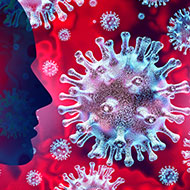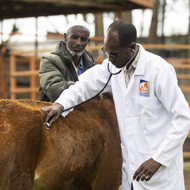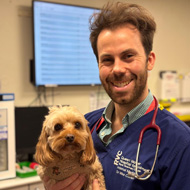The novel disease is named COVID-19 and the virus is SARS-CoV-2.
Insights could lead to new strategies to control virus spread
Scientists at the Roslin Institute are participating in the global effort to better understand and develop treatments for the ongoing COVID-19 outbreak.
Using publicly-available genetic information, researchers are investigating the similarities between the novel virus (formally named SARS-CoV-2), severe acute respiratory syndrome (SARS- CoV) and related bat viruses.
The team says the comparisons are already helping them to identify genetic regions of the virus that may be changing in response to human infections, and could lead to new control strategies.
A global effort
Many organisations in countries affected by COVID-19 have performed rapid whole-genome sequencing of the virus and shared their results via scientific databases. This allows researchers, no matter where they based, to study the information immediately.
Scientists are trying to ascertain when and how COVID-19 first passed from an animal to a human. With this information, they can then explore what factors enabled the virus to spread.
‘Currently, the genetic details of novel coronavirus samples from humans are very similar to each other,’ the scientists said. ‘They differ by only a few variations in the genetic code across the whole sequence of about 30,000 letters of DNA.
'This indicates that there has been a relatively short time since the disease originally emerged in humans for changes in the genetic code to accumulate. The approximate time of emergence can be estimated using the sequence data. This is done by looking at how and where the virus spreads, as well as how it evolves.’
Steroids ‘provide little benefit’
Scientists at the University of Edinburgh have concluded that, based on evidence from previous outbreaks, such as SARS, treating coronavirus patients with steroids ‘provides little benefit and could do more harm than good’.
‘Steroids impair the immune system’s ability to fight viruses and other infections that often develop in patients with a life-threatening illness,' the researchers said.
‘Patients with MERS or SARS who were treated with steroids seemed to take longer to clear the infection from their bodies, but the evidence is not clear and clinical trials will be needed to be sure.’







 The Veterinary Medicines Directorate (VMD) is inviting applications from veterinary students to attend a one-week extramural studies (EMS) placement in July 2026.
The Veterinary Medicines Directorate (VMD) is inviting applications from veterinary students to attend a one-week extramural studies (EMS) placement in July 2026.
